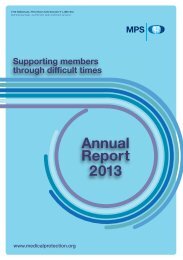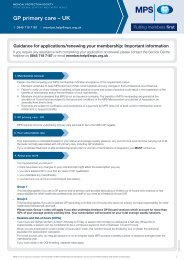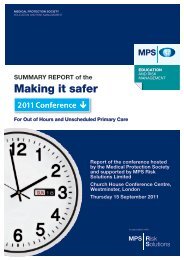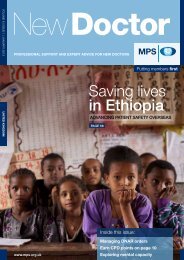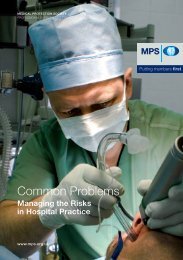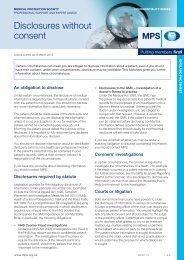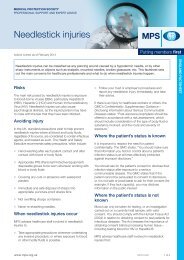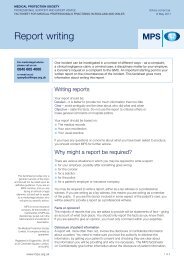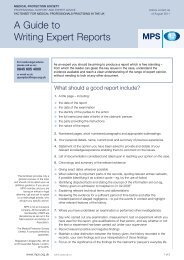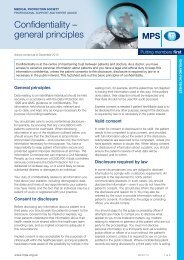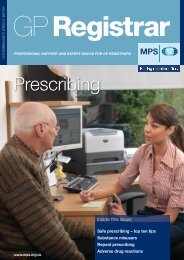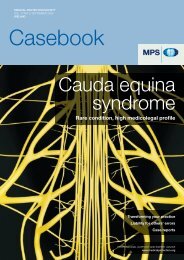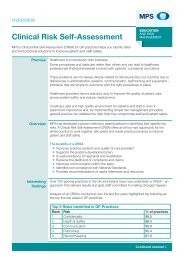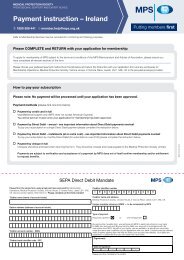Reporting deaths to the coroner - Medical Protection Society
Reporting deaths to the coroner - Medical Protection Society
Reporting deaths to the coroner - Medical Protection Society
Create successful ePaper yourself
Turn your PDF publications into a flip-book with our unique Google optimized e-Paper software.
2. Allow <strong>the</strong> death <strong>to</strong> be processed under <strong>the</strong><br />
“pro-forma” system.<br />
The Coroners’ Pro-forma is a special form for stating <strong>the</strong><br />
cause of death and providing brief particulars of <strong>the</strong><br />
background circumstances. Normally, <strong>the</strong> <strong>coroner</strong> will<br />
agree <strong>to</strong> use <strong>the</strong> “pro-forma” system where:<br />
■■<br />
■■<br />
■■<br />
It is a natural death and <strong>the</strong> only reason a death<br />
certificate cannot be issued is that <strong>the</strong> doc<strong>to</strong>r has not<br />
seen and treated <strong>the</strong> deceased for <strong>the</strong> condition from<br />
which <strong>the</strong>y died within 28 days of death<br />
The cause of death is not a natural one but <strong>the</strong>re are<br />
no suspicious circumstances<br />
The cause of death is not a natural one but a postmortem<br />
examination is unnecessary as a definite<br />
diagnosis had already been made.<br />
A doc<strong>to</strong>r should not proceed <strong>to</strong> use <strong>the</strong> “pro-forma”<br />
system for a death without having first agreed that<br />
course with <strong>the</strong> <strong>coroner</strong>.<br />
following <strong>the</strong> guidance in Confidentiality.”<br />
In relation <strong>to</strong> hospital <strong>deaths</strong>, <strong>the</strong> police officer will<br />
normally require a member of staff <strong>to</strong> formally identify <strong>the</strong><br />
body.<br />
If <strong>the</strong> <strong>coroner</strong> directs a postmortem examination, <strong>the</strong><br />
doc<strong>to</strong>r who reported <strong>the</strong> death should prepare a clinical<br />
summary for <strong>the</strong> pathologist.<br />
Stillbirths<br />
A judgment handed down by <strong>the</strong> Court of Appeal in<br />
Nor<strong>the</strong>rn Ireland concluded that in relation <strong>to</strong> <strong>the</strong><br />
Coroners Act 1959, <strong>the</strong> definition of a deceased person<br />
includes “a foetus in utero <strong>the</strong>n capable of being born<br />
alive:”. When dealing with cases of stillbirth, practitioners<br />
should consider <strong>the</strong>ir obligations <strong>to</strong> notify <strong>the</strong> <strong>coroner</strong> in<br />
accordance with Section 7 of <strong>the</strong> Act.<br />
Registration of a death<br />
NORTHERN IRELAND FACTSHEET<br />
The pro-forma should be sent immediately by fax and<br />
followed by hard copy <strong>to</strong> <strong>the</strong> Coroners Service. It should<br />
not be given <strong>to</strong> <strong>the</strong> family as <strong>the</strong>y may confuse it with an<br />
MCCD and try <strong>to</strong> take it <strong>to</strong> <strong>the</strong> Registrar.<br />
If <strong>the</strong> death was due <strong>to</strong> natural causes which a doc<strong>to</strong>r<br />
is able <strong>to</strong> confirm, <strong>the</strong> <strong>coroner</strong> will advise <strong>the</strong> Registrar<br />
by issuing a Coroner’s Notification and <strong>the</strong> death can be<br />
registered.<br />
3. Direct a postmortem examination.<br />
A <strong>coroner</strong> will usually request a postmortem examination<br />
if <strong>the</strong>re is uncertainty over <strong>the</strong> cause of death, or <strong>the</strong><br />
death was sudden and <strong>the</strong> cause unknown.<br />
If a postmortem is ordered <strong>the</strong>n <strong>the</strong> death cannot be<br />
registered until <strong>the</strong> <strong>coroner</strong>’s investigation has been<br />
completed. However, <strong>the</strong> <strong>coroner</strong>’s liaison officer will<br />
provide <strong>the</strong> family with a “Cornoner’s Certificate of<br />
Evidence of Death” which can be helpful in <strong>the</strong><br />
administration of <strong>the</strong> Estate.<br />
Once <strong>the</strong> investigation is complete, <strong>the</strong> <strong>coroner</strong> will<br />
decide whe<strong>the</strong>r <strong>to</strong> hold an inquest or, if this is not<br />
necessary, <strong>the</strong> <strong>coroner</strong> will issue a Coroner’s Notification<br />
<strong>to</strong> <strong>the</strong> Registrar of Deaths.<br />
If an inquest is <strong>to</strong> be held, witnesses may be called <strong>to</strong><br />
give evidence in person or required <strong>to</strong> submit written<br />
evidence <strong>to</strong> be presented at <strong>the</strong> inquest.<br />
The GMC’s Good <strong>Medical</strong> Practice states: “You must<br />
co-operate with formal inquiries and complaints<br />
procedures and must offer all relevant information while<br />
Before a death can be registered, <strong>the</strong>re must be ei<strong>the</strong>r a<br />
properly issued MCCD issued by a registered medical<br />
practitioner (<strong>the</strong> death certificate is issued by <strong>the</strong><br />
Registrar of Births and Deaths) or a certificate from a<br />
<strong>coroner</strong> issued after appropriate investigations.<br />
If you are <strong>the</strong> attending medical practitioner in a patient’s<br />
last illness, you are required by law <strong>to</strong> sign a certificate<br />
stating <strong>the</strong> cause of death <strong>to</strong> <strong>the</strong> best of your knowledge<br />
and belief. This must be submitted by <strong>the</strong> informant <strong>to</strong><br />
<strong>the</strong> Registrar of Births and Deaths. However, if <strong>the</strong> death<br />
has been or will be referred <strong>to</strong> <strong>the</strong> <strong>coroner</strong>, you should<br />
not complete <strong>the</strong> MCCD until <strong>the</strong> matter has been<br />
discussed with <strong>the</strong> <strong>coroner</strong>. The certificate is a legal<br />
statement and medical practitioners are obliged <strong>to</strong> take<br />
reasonable steps <strong>to</strong> check <strong>the</strong> information. Relevant<br />
information must not be deliberately left out.<br />
O<strong>the</strong>r functions of <strong>the</strong> <strong>coroner</strong>s<br />
A <strong>coroner</strong> must also be notified in every case when a<br />
body is <strong>to</strong> be taken out of Nor<strong>the</strong>rn Ireland. Coroners<br />
also currently have responsibility for investigating when<br />
treasure is found in <strong>the</strong>ir district.<br />
For medicolegal advice please call us on:<br />
0845 605 4000<br />
or email us at: querydoc@mps.org.uk<br />
This factsheet provides only a general overview of <strong>the</strong> <strong>to</strong>pic and should not be relied upon as definitive<br />
guidance. If you are an MPS member, and you are facing an ethical or legal dilemma, call and ask <strong>to</strong> speak<br />
<strong>to</strong> a medicolegal adviser, who will give you specific advice.<br />
MPS is not an insurance company. All <strong>the</strong> benefits of membership of MPS are discretionary as set out in <strong>the</strong><br />
Memorandum and Articles of Association. The <strong>Medical</strong> <strong>Protection</strong> <strong>Society</strong> Limited. A company limited by<br />
guarantee. Registered in England No. 36142 at 33 Cavendish Square, London, W1G OPS.<br />
www.mps.org.uk<br />
Image © Günay Mutlu / iS<strong>to</strong>ckpho<strong>to</strong>.com<br />
MPS0916:<br />
2 of 3



